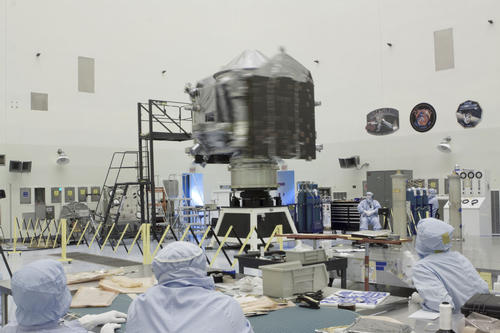A NASA spacecraft that will examine the upper atmosphere of Mars in unprecedented detail is undergoing final preparations for a scheduled 1:28 p.m. EST Monday, Nov. 18 launch from Cape Canaveral Air Force Station in Florida.
The Mars Atmosphere and Volatile Evolution mission (MAVEN) is the first mission to study the martian upper atmosphere. MAVEN will examine specific processes on Mars that led to the loss of much of its atmosphere. Data and analysis could tell planetary scientists the history of climate change on the Red Planet and provide further information on the history of planetary habitability.

Inside the Payload Hazardous Servicing Facility at NASA’s Kennedy Space Center in Florida, engineers and technicians perform a spin test of the Mars Atmosphere and Volatile Evolution, or MAVEN, spacecraft. Image credit: NASA.
“The MAVEN mission is a significant step toward unraveling the planetary puzzle about Mars’ past and present environments,” said John Grunsfeld, associate administrator for NASA’s Science Mission Directorate in Washington. “The knowledge we gain will build on past and current missions examining Mars and will help inform future missions to send humans to Mars.”
The 5,410-pound spacecraft will launch aboard a United Launch Alliance Atlas V 401 rocket on a 10-month journey to Mars. After arriving at Mars in September 2014, MAVEN will settle into its elliptical science orbit.
Over the course of its one-Earth-year primary mission, MAVEN will observe all of Mars’ latitudes. Altitudes will range from 93 miles to more than 3,800 miles. During the primary mission, MAVEN will execute five deep dip maneuvers, descending to an altitude of 78 miles. This marks the lower boundary of the planet’s upper atmosphere.
“Launch is an important event, but it’s only a step along the way to getting the science measurements,” said Bruce Jakosky, principal investigator at the University of Colorado, Boulder’s Laboratory for Atmospheric and Space Physics (CU/LASP) in Boulder. “We’re excited about the science we’ll be doing, and are anxious now to get to Mars.”